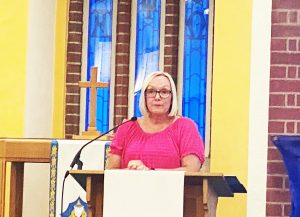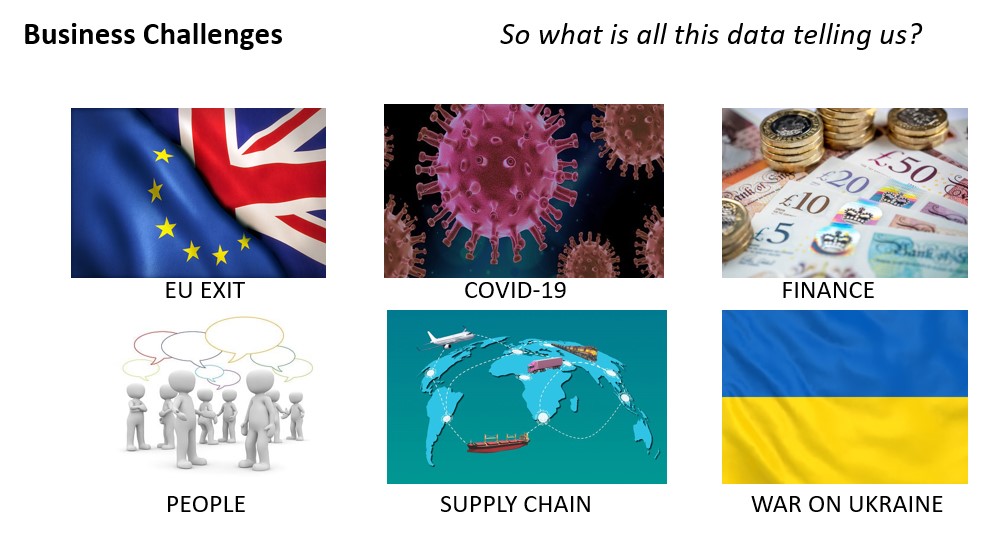Wednesday April 27th saw the launch of our new network, the Supporters of Faith at Work in Worcestershire (SFWW), as part of a speaker event, ‘Re-engaging with the Economy’. This was the first face to face event FWW has held for more than two years. It was good to get back together, and discuss some very contemporary aspects of our changed economic context.
The SFWW initiative aims to promote workplace chaplaincy in the county, seeking support through prayer and giving. We want to expand our work but are faced with a £15,000 budget deficit for this year alone.
But whilst addressing our needs as a charity we also were able to use the evening to focus on what was happening in the economy and remind ourselves why Faith at Work in Worcestershire exists in the first place. We were fortunate to welcome, as our keynote speaker, Sharon Smith, CEO of Herefordshire and Worcestershire Chamber of Commerce. From surveys of the Chamber’s 1300 member businesses Sharon was able to give an up-to-date summary of the current challenges and opportunities they face. It was a sobering picture, in the light of which, FWW Development Officer, Dick Johnson, here reflects on FWW ‘s response.
On the morning of the launch event for SFWW, when Sharon Smith gave us such a clear and thought-provoking presentation on the state of our local and regional economy, I was with our team of chaplains in Redditch at the Kingfisher Shopping Centre. Though each team member has their assigned section of the Centre, and visit as their diaries allow, once a fortnight the team meet for chaplaincy at an agreed time, praying together before going out separately, and then returning for a coffee and debrief together. This approach brings a sense of teamwork, and mutual support to a task which otherwise can be a lonely one. It also promotes reflection and sharing, within the constraints of confidentiality.
On this day, when the team met, they were joined by Justin, a BBC Hereford & Worcester radio reporter, who was responding to our press release about the evening event. Justin recorded short features with our chaplains for use in the morning show, and interviewed some of those they visited. He was also able to interview Ken Williams, General Manager of the Kingfisher Centre, who was on hand to give his take on the state of the economy and the valuable contribution the chaplains bring to those who trade in the Kingfisher.
Ken is a great supporter of chaplaincy and Faith at Work in Worcestershire, understanding as he does, from years of experience in the industry, the challenges of working in this sector.
Continues from HERE, where first part published in FWW Newsletter…
He was also characteristically optimistic, and highlighted the opportunities the current economic climate offers. But even he admitted it is an unsettling story, as inflation rises far faster than wages, supply chains are stretched and there continues to be a shortage of labour, all of which puts a squeeze on the economy, something Sharon was to put in a wider context later that evening as she reported on feedback from the Chamber’s members.

Sharon reported how, in the nearly 6 years since the Brexit Referendum, migration from the EU has fallen an estimated 58%. With this drastic reduction in overseas workers some industries have struggled to recruit. In the retail sector, such as the Kingfisher, where previously any vacancy had attracted 30 or more applications, now there are only 3 or 4. In labour intensive businesses this has become a real crisis, with some vegetable and fruit growers opting not to plant a full crop this year, because of the lack of seasonal labour, which leads to higher prices in the supermarket. And its not just Brexit causing this. COVID has prompted many to review their work-life balance, with many choosing not to return to work full time or at all, or seeking more flexible ways of working.
On the supply side, businesses are reporting massive cost increases in raw materials and transport, with a standard shipping container from the far East now costing £16,000, a 16 fold increase on a few years ago. With increased confusion and delays due to paperwork and customs, some businesses are not surviving. Sharon told of one of their members which had faced a five month delay in the delivery of glass jars which, together with increased transport costs, meant they simply couldn’t make the business profitable, and were looking to close. For transport companies the escalating fuel costs mean they are reviewing weekly their prices charged to customers.

The economy is clearly in a fragile position, with a very real danger of falling into recession. This, the need to meet the continuing challenge of the climate emergency, and the particular difficulties facing young people entering the labour market, were amongst topics raised in questions to the speaker after Sharon’s talk, and resulted in a thoughtful discussion.
We must also remember that we were meeting in the midst of the Easter Season, celebrating the resurrection of Christ. How were we to bring together this truth, the promise and hope of new life in Christ, with the daily experience of so many facing such economic uncertainty and struggle to survive? If resurrection was to mean anything, it had to mean something in that context.
This strikes at the heart of the church’s mission within the economy, taking seriously the reality being lived whilst proclaiming a message of resurrection in ways that could be understood by those going through this experience. How to do this? Concluding the evening with the launch of the Supporters of Faith at Work in Worcestershire network, aimed at sustaining and growing our work, is one answer to this – we need to be alongside people as they face the challenges of these days. Which means more chaplaincy, more chaplains and convincing more churches that this is part of their mission. It also means offering chaplaincy to more workplaces.
There is a bit of ‘chicken and egg’ about this. Do we seek to recruit chaplains, and then think where they might be assigned – negotiating with businesses for us to provide a chaplain? Or do we promote chaplaincy to workplaces and then, when they say, ‘yes, we’d love a chaplain’, search for people to train as chaplains, with the risk that we don’t have enough chaplains in the right places? The answer is we probably need to do both.
The other answer, which goes with this, is to be confident in the reason we are there. The resurrection is about redemption, renewal and hope; about taking the most hopeless situation and looking for Christ’s light in the darkness.
Chaplains need to be encouragers – literally en-couraging those they befriend. They need to be pray-ers, – bringing before God, in the name of the risen Christ, the suffering and the struggle we encounter in other peoples’ stories, with the confidence of those who believe in life after death – and life before death. Chaplains need to see the image of God in those they meet, knowing they also are God’s sons and daughters adopted through Christ to receive His life, in all its fullness, and giving thanks for the perseverance, creativity and compassion they encounter. Chaplains need to be prophets, challenging the unjust structures of our economy, which only serve the rich and powerful, and finding ways to call out exploitation of the vulnerable. Above all Chaplains need to be apostles, sent by the risen Christ, to continue His work of care and compassion, of healing and bringing hope, to those to whom they are sent.
